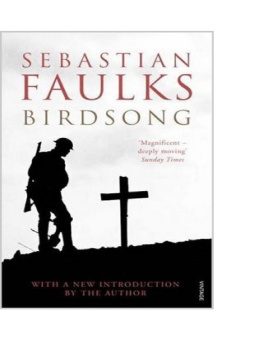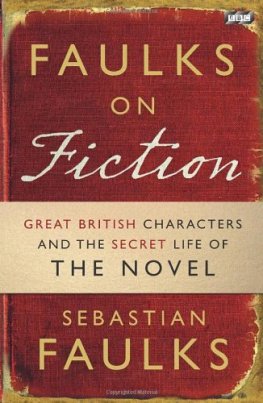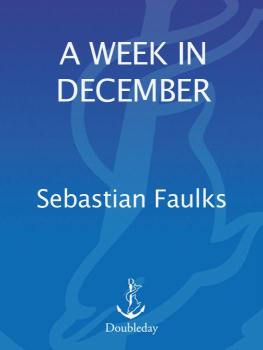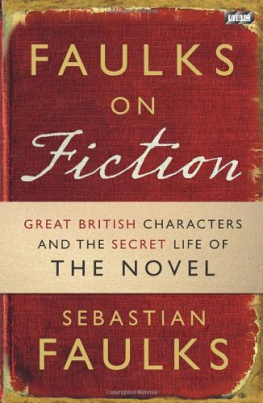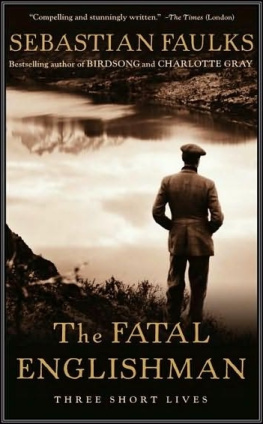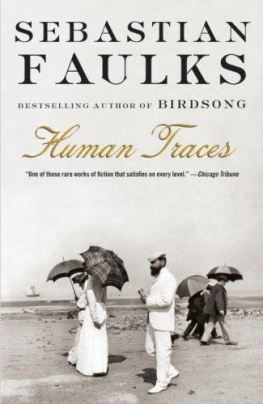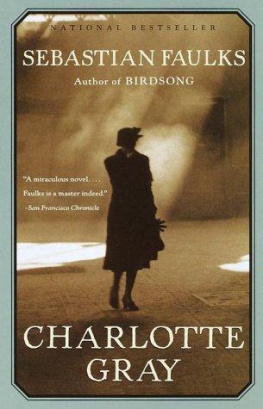Sebastian Faulks - Birdsong
Here you can read online Sebastian Faulks - Birdsong full text of the book (entire story) in english for free. Download pdf and epub, get meaning, cover and reviews about this ebook. genre: Detective and thriller. Description of the work, (preface) as well as reviews are available. Best literature library LitArk.com created for fans of good reading and offers a wide selection of genres:
Romance novel
Science fiction
Adventure
Detective
Science
History
Home and family
Prose
Art
Politics
Computer
Non-fiction
Religion
Business
Children
Humor
Choose a favorite category and find really read worthwhile books. Enjoy immersion in the world of imagination, feel the emotions of the characters or learn something new for yourself, make an fascinating discovery.
- Book:Birdsong
- Author:
- Genre:
- Rating:3 / 5
- Favourites:Add to favourites
- Your mark:
- 60
- 1
- 2
- 3
- 4
- 5
Birdsong: summary, description and annotation
We offer to read an annotation, description, summary or preface (depends on what the author of the book "Birdsong" wrote himself). If you haven't found the necessary information about the book — write in the comments, we will try to find it.
Birdsong — read online for free the complete book (whole text) full work
Below is the text of the book, divided by pages. System saving the place of the last page read, allows you to conveniently read the book "Birdsong" online for free, without having to search again every time where you left off. Put a bookmark, and you can go to the page where you finished reading at any time.
Font size:
Interval:
Bookmark:
Jack watched the lieutenant go over to the shelves and take down a sketch.
"The human anatomy is extraordinarily simple," he said. "The construction of the legs for instance: two long bones with a simple joint for flexing, and the proportions always the same. But when you draw them it's difficult to suggest the shape. Everyone can see this muscle on the thigh, the quadriceps. I never knew there was another one here, inside, the sartorius. But if you emphasize it too much the figure looks muscle-bound."
Jack watched the lieutenant's finger trace the lines of the leg on the drawing as he spoke. He was not sure whether the man was teasing him, extending his agony, or whether he really wanted to talk about drawing.
"Of course," the lieutenant said with a sigh, "the war has provided all of us with daily lessons in anatomy. I could write a paper on the major organs of the British private soldier. Liver in section. Bowel, extent of, when eviscerated. The powdery bone of the average English subaltern."
Jack coughed. "Excuse me, sir. Can I ask about the charge?"
"The charge?"
"For God's sake, Wraysford," said Weir. "You told this man to report to you because he was asleep. He wants to know if you are going to have him courtmartialled. He wants to know if he's going to have an art lesson or whether he's going to be shot."
"There's no charge. You are not under my command."
Jack felt a hot stinging in his eyes.
"I'm sure your own company commander will punish you if he wants to." Weir shook his head. "No further action."
"Thank you, sir. Thank you."
Jack looked at the two men with love and gratitude. They understood the difficulties of a man who had been stretched too far. He felt sure that their mercy sprang from compassion for him. He took out Margaret's letter. In his enthusiasm for living he wanted to share the burden of his son's illness.
"You see here, sir. I had this letter from my wife. Our boy's been taken poorly. I was worried for him. I'd not slept when I came up from the tunnel, I was so worried about him."
He handed the letter to Weir, who nodded. "See this, Wraysford?" he said, pushing it across the table.
"Yes," said Stephen. "I see it. Diphtheria, it says. That's serious."
"Will I be allowed leave to go and see him?"
Stephen raised an eyebrow toward Weir. "I doubt it. We're undermanned as it is," said Weir.
Jack said, "Have you got children, sir?"
Weir shook his head. "Not married."
"You, sir?"
"No," said Stephen.
Jack nodded a few times to himself. "I suppose it's funny when I'm out here with men getting killed all round me and it's him that's in danger." Stephen said, "Every one of the men we've killed is someone's son. Do you think of that when you see them dead? Do you wonder what their mothers thought when they first held them to their breast--that they would end like this?"
"No, sir. I hadn't thought of it like that."
The three men drank their tea. From outside came the whining of shells. They could feel the reverberation of the explosion in the dugout. Fragments of dried earth fell from the ceiling.
Stephen said, "Two of my men were in a shellhole listening for eight hours last night in no-man's-land. What do you think they were thinking about all that time? It's not as if they're allowed to talk." He was looking at Jack.
"I don't know, sir. Perhaps it's like when we're in the tunnel. You stop thinking at all after a bit. It's as though you've stopped living. Your mind goes dead."
"I'd like to go down your tunnel," said Stephen.
"No you wouldn't," said Weir. "Even the miners don't like it."
"I'd like to see what it feels like. Some of my men think you don't work fast enough down there. They think you don't hear the noise of the enemy. They're terrified of being blown up from underneath."
Weir laughed. "We know that all right."
Jack shifted in his chair. There was something strange about the two officers. He suspected they were drunk. He had always thought of Weir as dependable. Like all the tunnelling company commanders, he was a regular engineer who had been transferred. He was careful and reliable underground, even though he had had no experience of it before the war. But his eyes looked wild and red with whisky. The brownish stubble on his cheeks and chin was surely the result of more than one morning's missed shave. The lieutenant, Jack thought, looked more sober, but in some ways even stranger. You could not be sure whether he was serious. He seemed forgetful and distant, but also enthusiastic about going underground. It was as though he was not all there, Jack thought. The affection and gratitude he had felt at first began to evaporate. He didn't want to share any more of his personal feelings with them. He wanted to be back with Tyson and Shaw, or even Wheeler and Jones with their irritating chatter. At least with them he would know where he was.
"Any idea when we'll get some rest, sir?" he asked Weir.
"Tomorrow, I should think. They couldn't keep us here longer than that. What about your men, Wraysford?"
Stephen sighed. "God knows. I hear rumours all the time from battalion headquarters. We will have to attack sooner or later. Not here, though."
"Are we going to have to lose a few lives just to placate the French?" Weir laughed.
"Yes. Oh, yes. They want to feel they're not alone in this. But I believe they will reap the whirlwind."
Riley appeared from the back of the dugout. "It's nearly six, sir. Stand-to in ten minutes."
"You'd better go, Firebrace," said Weir.
"I'll see you in that tunnel," said Stephen.
"Thank you, sir."
Jack climbed back out of the dugout. It was almost light outside. The low sky of Flanders met the earth at a short horizon, only a few miles behind the German lines. He breathed in deeply on the morning air. His life had been spared; the last trace of elation came to him as he looked toward the back of the trench and saw the plumes from cigarettes and steam from the tea that cold hands were now clasping. He thought of the stench of his clothes, the lice along the seams, the men he was frightened to befriend in case their bodies came apart the next day in front of his eyes. It was the hour of Tyson's ablutions, when he would empty his bowels into a paintpot and throw the contents over the top.
From the officers' dugout behind him came the sound of piano music, a rising melody under the scratch of a thick gramophone needle.
*
When they were finally relieved, the miners were allowed to go to a village further back than their usual billet for a rest. The men were so tired they found it hard to march. Three miles behind the front line they were on a prepared road with ditches on either side. The order "easy" had been given, and some men smoked as they walked. Jack Firebrace concentrated on keeping a straight line under the weight of his pack with its extra digging tools. There was a village dimly visible at the end of an avenue, but he found that if he focused on it he lost the ability to coordinate his feet. He felt as though he were walking across a ravine and the road was a hundred feet below. Twice he jerked awake, realizing he had been walking in his sleep. A few ranks behind him, Wheeler had to be pulled from the ditch. Jack closed his eyes for a moment against the brightness of the daylight, but quickly reopened them as he felt a sensation of nausea at his loss of balance.
There were things he had thought he might never see again, signs that life had persisted outside the narrow inferno of his existence. A curate rode toward them on a bicycle and raised his flat hat as he passed the column of men. Beside the road was grass that was still green, that had not been uprooted. There was blossom in the trees.
When they stopped in the village square, Sergeant Adams gave them leave to sit down while officers went in search of billets.
Next pageFont size:
Interval:
Bookmark:
Similar books «Birdsong»
Look at similar books to Birdsong. We have selected literature similar in name and meaning in the hope of providing readers with more options to find new, interesting, not yet read works.
Discussion, reviews of the book Birdsong and just readers' own opinions. Leave your comments, write what you think about the work, its meaning or the main characters. Specify what exactly you liked and what you didn't like, and why you think so.

